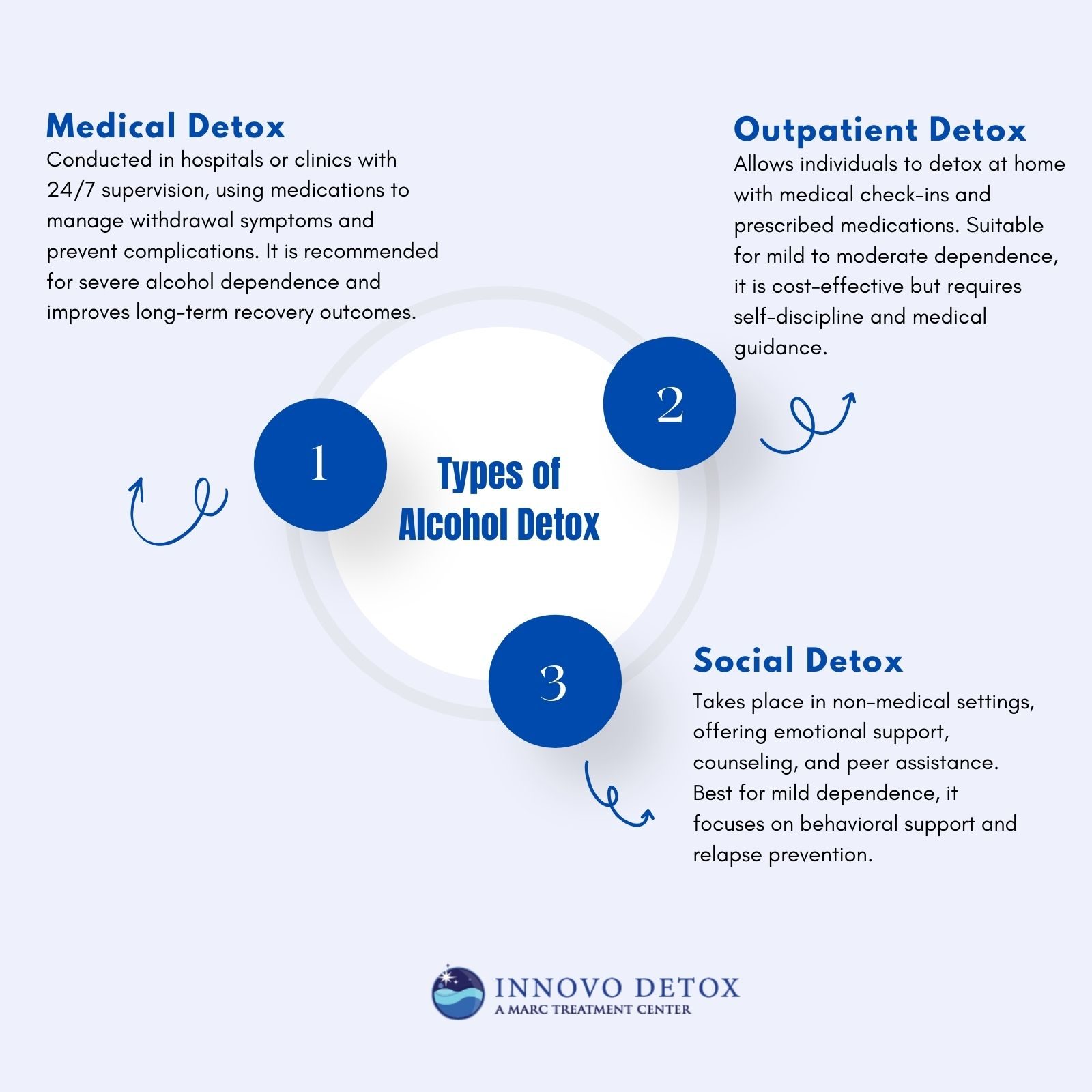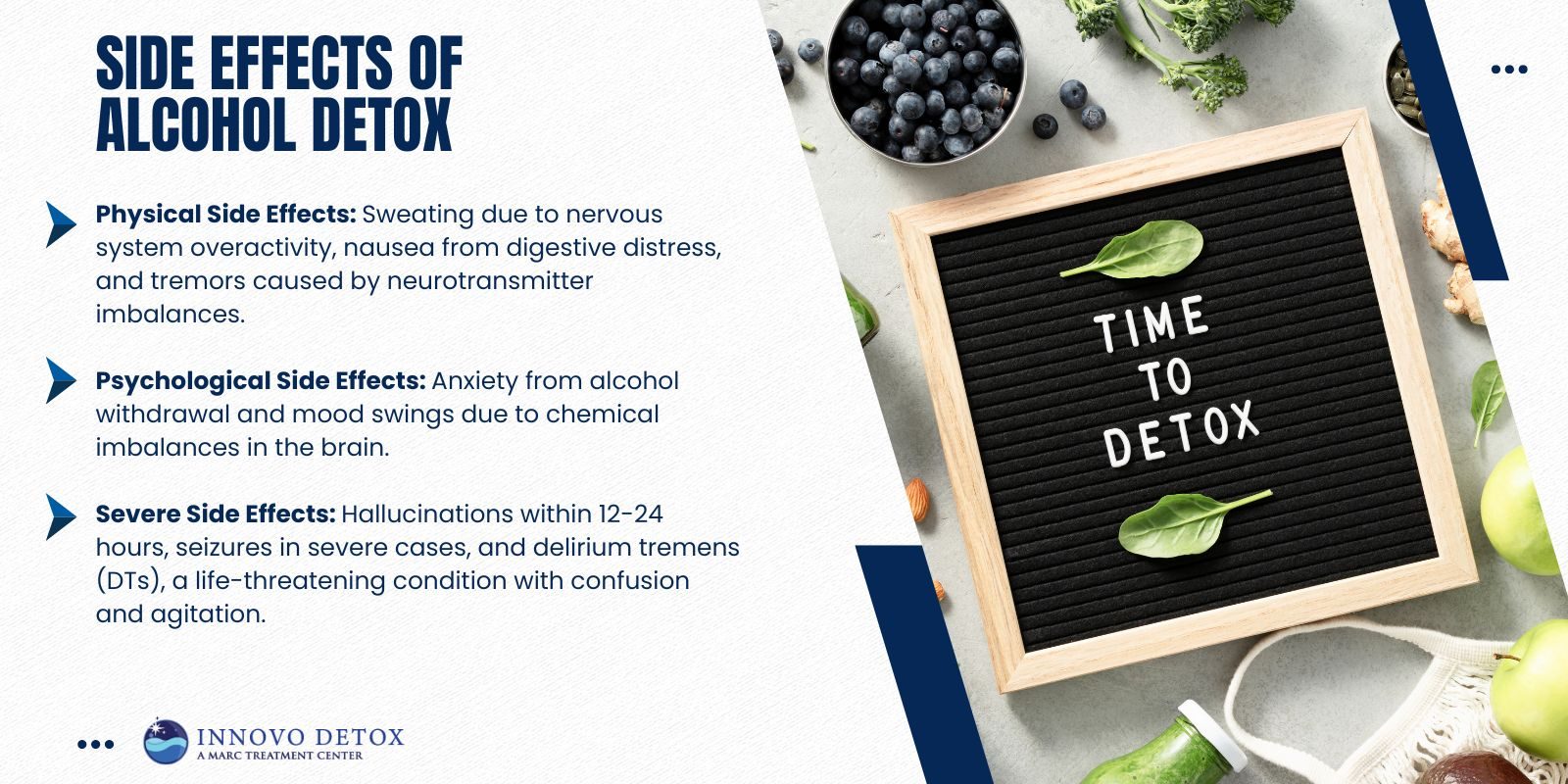Alcohol detox is the first step in recovery, helping your body and mind stabilise as they adjust to life without alcohol. It eases withdrawal symptoms and requires medical supervision to ensure safety, especially when symptoms become severe.
Detox progresses through three stages: mild (6–12 hours) with anxiety and nausea, moderate (12–48 hours) with tremors and a racing heart, and severe (48–72 hours) with risks like seizures and delirium tremens. According to the same NCDAS report, Pennsylvania experiences an average of 5,703 annual deaths attributable to excessive alcohol use.
The type of detox you need depends on your symptoms. Options include medical detox with full supervision, outpatient detox for milder cases, and social detox with peer support.
Medications like benzodiazepines, naltrexone, and beta-blockers help manage symptoms and reduce relapse risk. While detox usually lasts 3–7 days, some people experience lingering symptoms that need continued care.
What is Alcohol Detox?
Alcohol detox is the process of clearing alcohol from your system while helping your body and mind adjust to its absence. It’s the first and most critical step in breaking alcohol dependence, as detox removes built-up toxins and stabilises you physically and mentally.
Because withdrawal symptoms range from mild anxiety and nausea to life-threatening complications like seizures and delirium tremens (DTs), medical supervision is essential. Supervised detox uses medications like benzodiazepines, anticonvulsants, and beta-blockers.
What are the Symptoms of Alcohol Detox?
The symptoms of alcohol detox include mild to severe withdrawal effects, such as anxiety, nausea, tremors, rapid heartbeat, hallucinations, and seizures, which peak within 24 to 72 hours after the last drink. The severity depends on factors like alcohol dependence level, health status, and previous withdrawal history.
The symptoms of alcohol detox are:
- Anxiety: A feeling of nervousness and restlessness occurs due to the brain’s overactive stress response, as alcohol suppresses neurotransmitters like GABA..
- Sweating: Excessive perspiration results from the autonomic nervous system (ANS) overcompensating for the absence of alcohol, which previously suppressed it. Sweating affects almost everyone undergoing alcohol detox.
- Nausea: Nausea is a common symptom caused by alcohol’s effect on the gastrointestinal tract and central nervous system.
- Tremors: Tremors are involuntary shaking, especially in the hands, due to GABA deficiency and increased norepinephrine levels. Tremors begin within 6 to 12 hours after the last drink and affect 50-60% of individuals detoxing.
- Rapid heartbeat (Tachycardia): The heart rate increases as the body adjusts to alcohol absence, leading to cardiovascular stress.
- Irritability: Mood swings and agitation arise due to dopamine disruption and withdrawal-related stress.
What are the Stages of Alcohol Detox?
The stages of alcohol detox occur in three phases, beginning with mild symptoms and potentially escalating to severe complications. These stages unfold within 6 to 72 hours after the last drink, requiring medical supervision for safety.
The stages of alcohol detox are:
Stage 1 (Mild Symptoms): 6-12 Hours After Last Drink
Within 6 to 12 hours of stopping alcohol, individuals experience mild withdrawal symptoms such as anxiety, headaches, nausea, and insomnia. These symptoms arise as the body adjusts to the absence of alcohol, which previously suppressed the central nervous system. During this stage, the brain’s neurotransmitter balance shifts, causing early signs of withdrawal discomfort.
Stage 2 (Moderate Symptoms): 12-48 Hours
Withdrawal symptoms intensify between 12 and 48 hours, leading to elevated heart rate, high blood pressure, tremors, sweating, and irritability. This phase results from increased excitability in the nervous system, as alcohol no longer inhibits brain activity. Some individuals also experience hallucinations, though they remain aware that these perceptions are not real.
Stage 3 (Severe Symptoms): 48-72 Hours
The most severe withdrawal symptoms emerge between 48 and 72 hours. This stage includes seizures, confusion, hallucinations, and delirium tremens (DTs), a life-threatening condition that affects 3-5% of individuals undergoing detox. Without alcohol addiction treatment, complications are fatal, making supervised detox important for high-risk patients.
How Long Does it Take for Alcohol Detox to Start?
Alcohol detox takes 6 to 12 hours after the last drink to begin, as withdrawal symptoms start emerging once alcohol levels in the bloodstream drop significantly. The onset of detox treatment depends on factors such as the severity of alcohol dependence, individual metabolism, overall health, and previous withdrawal history.
What are the Types of Alcohol Detox?
The types of alcohol detox include medical detox, outpatient detox, and social detox. Each offers different levels of supervision and support based on the individual’s needs and severity of alcohol dependence.

The types of alcohol detox are explained below:
Medical Detox
Medical detox takes place in hospitals or specialized clinics under 24/7 medical supervision. It involves the use of medications such as benzodiazepines or anticonvulsants to manage withdrawal symptoms and prevent complications like seizures and delirium tremens (DTs). This method is recommended for individuals with severe alcohol dependence or a history of complicated withdrawal to ensure a safe and controlled detox process.
Outpatient Detox
Outpatient detox allows individuals to detox at home while receiving regular medical check-ins and prescribed medications for withdrawal management. This option is suitable for those with mild to moderate alcohol dependence and a strong support system. Patients attend scheduled clinic visits to monitor progress and manage symptoms, reducing the cost and disruption associated with inpatient treatment. It requires a high level of self-discipline and medical guidance to prevent relapse or complications.
Social Detox
Social detox occurs in non-medical settings, such as rehabilitation centers or community-based facilities, where individuals receive emotional support, counseling, and peer assistance during withdrawal. This approach does not involve medication or medical intervention, making it more suitable for individuals with mild alcohol dependence who do not require intensive medical supervision.
How is Alcohol Detox Treated Medically?
Alcohol detox is medically treated with supervised care, medications, IV fluids, and continuous monitoring of vital signs to manage withdrawal symptoms and prevent complications.
Healthcare providers assess the patient’s condition and administer benzodiazepines to reduce seizures and anxiety, anticonvulsants for neurological stability, and IV fluids with electrolytes to prevent dehydration.
In severe cases, hospital-based detox is necessary, especially for individuals at risk of delirium tremens (DTs), seizures, or heart complications. Medical supervision ensures a safer withdrawal process, reducing the likelihood of life-threatening complications.
What Medications are Prescribed for Alcohol Detox?
Medications prescribed for alcohol detox include benzodiazepines, anticonvulsants, beta-blockers, and relapse prevention drugs like disulfiram and naltrexone. These medications help manage withdrawal symptoms, reduce complications, and support long-term recovery.

The medications prescribed for alcohol detox include:
Benzodiazepines
Benzodiazepines, such as diazepam (Valium), lorazepam (Ativan), and chlordiazepoxide (Librium), are the primary medications for alcohol withdrawal management. They enhance GABA (gamma-aminobutyric acid) activity, a neurotransmitter that calms the nervous system, reducing anxiety, tremors, and seizure risk. Benzodiazepines are administered in a tapering schedule over 3 to 7 days to prevent dependence.
Anticonvulsants
Anticonvulsants like gabapentin (Neurontin) and carbamazepine (Tegretol) help stabilize brain activity and reduce the risk of withdrawal-induced seizures. They are used when benzodiazepines are not suitable, especially for patients with a history of substance abuse or dependence. These medications are prescribed for one to two weeks to ease neurological overactivity during detox.
Beta-Blockers
Beta-blockers such as propranolol and atenolol help manage withdrawal symptoms like rapid heartbeat (tachycardia), high blood pressure, and anxiety. By blocking adrenaline receptors, these medications reduce physical stress on the body during detox. Beta-blockers are particularly beneficial for individuals with preexisting cardiovascular conditions and are used short-term during withdrawal.
Disulfiram & Naltrexone
Disulfiram (Antabuse) and naltrexone (ReVia, Vivitrol) are prescribed after detox to support long-term sobriety. Disulfiram creates an adverse reaction to alcohol, causing nausea, flushing, and palpitations if alcohol is consumed, acting as a deterrent.
Naltrexone blocks opioid receptors that reinforce alcohol’s pleasurable effects, reducing cravings and the likelihood of relapse. Depending on individual recovery progress, these medications are used for months to years.
What are the Side Effects of Alcohol Detox?
Common side effects of alcohol detox include physical symptoms like sweating and tremors, psychological effects such as anxiety and mood swings, and severe complications like seizures or delirium tremens. These symptoms vary in intensity depending on the individual’s dependence level and overall health.

The side effects of alcohol detox are explained below:
- Sweating: Excessive perspiration occurs as the body adjusts to alcohol absence, a result of autonomic nervous system hyperactivity.
- Nausea: Many individuals experience digestive distress due to alcohol’s impact on the gastrointestinal tract and metabolic changes.
- Tremors: Shaking hands or body tremors stem from neurotransmitter imbalances, particularly reduced GABA activity.
- Anxiety: Heightened stress levels arise as the brain adjusts to functioning without alcohol’s depressant effects.
- Mood Swings: Emotional instability is common due to fluctuating dopamine and serotonin levels.
- Hallucinations: Some individuals experience visual or auditory hallucinations within 12-24 hours of detox, linked to alcohol-induced changes in brain chemistry.
- Seizures: Occurring in 5% to 25% of cases, seizures result from hyperexcitable neural activity due to alcohol withdrawal.
What is Alcohol Withdrawal Syndrome?
Alcohol withdrawal syndrome (AWS) is a set of physical and psychological symptoms that occur when a person suddenly stops or reduces heavy alcohol consumption. Symptoms range from mild tremors and anxiety to severe complications like seizures and delirium tremens (DTs), which is life-threatening.
Medical supervision is necessary, especially in severe cases, with treatments including medications, IV fluids, and supportive care to manage alcohol withdrawal symptoms and prevent complications.




